| Record of the Eighth FNCA Coordinators Meeting
February 7- 9, 2007, Tokyo, Japan
 The 8th FNCA Coordinators Meeting (CM) was held from February 7 through February 9, 2007 in Tokyo , Japan , hosted by the Atomic Energy Commission (AEC) of Japan , the Cabinet Office (CAO) of Japan . The 8th FNCA Coordinators Meeting (CM) was held from February 7 through February 9, 2007 in Tokyo , Japan , hosted by the Atomic Energy Commission (AEC) of Japan , the Cabinet Office (CAO) of Japan .
The Meeting was attended by delegates from 9 FNCA countries, i.e., Australia , the People's Republic of China , Indonesia , Japan , the Republic of Korea , Malaysia , the Philippines , Thailand and Viet Nam . Dr. Prinath Dias, IAEA participated in this meeting as observer.
*:FNCA coordinator
| Australia |
: |
Dr. Ron Francis Cameron*, Chief of Operations, Australian Nuclear Science and Technology Organisation (ANSTO) |
| China |
: |
Dr. Yang Dazhu*, Director General, Department of International Cooperation, China Atomic Energy Authority (CAEA) |
| Indonesia |
: |
Mr. Aang Hanafiah R. Wangsaatmadja*, Deputy Chairman, Utilization of the result of R&D and PI of Nuclear Science and Technology, National Nuclear Energy Agency of Indonesia (BATAN) |
| Japan |
: |
Dr. Sueo MACHI*, FNCA Coordinator of Japan |
| Korea |
: |
Mr. Woon-Ha Ji, Assistant Director, Atomic Energy Cooperation Division, Atomic Energy Bureau, Ministry of Science & Technology (MOST) |
| Malaysia |
: |
Dr. Daud Bin Mohamad, Director General, Malaysian Nuclear Agency |
| The Philippines |
: |
Dr. Alumanda Molina Dela Rosa*, Director, Philippine Nuclear Research Institute (PNRI) |
| Thailand |
: |
Dr. Somporn Chongkum*, Director, Thailand Institute of Nuclear Technology (TINT) |
| Viet Nam |
: |
Dr. Bui Van Tuan, Vice Chairman, Vietnam Atomic Energy Commission (VAEC) |
| [Observers] |
| IAEA |
: |
Dr. Prinath Dias, Senior Program Management Officer and RCA Focal Person, Division for Asia and the Pacific, Department of Technical Cooperation, International Atomic Energy Agency (IAEA)
|
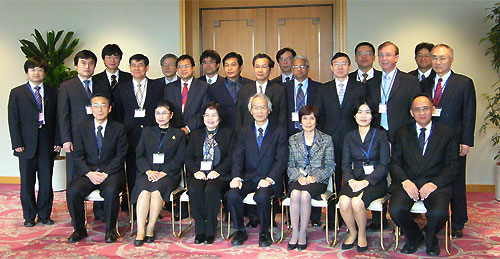 |
Opening Session
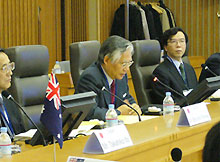 Dr. Shunsuke Kondo, Chairman, Atomic Energy Commission of Japan, gave the opening remarks at the Opening Session. He expressed warm welcome to all participants and wished the successful deliberation and outcome of the meeting. Dr. Shunsuke Kondo, Chairman, Atomic Energy Commission of Japan, gave the opening remarks at the Opening Session. He expressed warm welcome to all participants and wished the successful deliberation and outcome of the meeting.
Major points of the meeting agenda
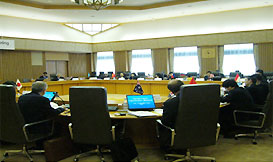 The major points of the meeting agenda were as follows: The major points of the meeting agenda were as follows:
- Accomplishments and work plans of 12 ongoing projects and a panel
- The termination or extension of the "Tc-99m Generator" and "Biofertilizer" projects
- Implementation of ANTEP and its pilot project
- Setting up of the "Study Panel for Cooperation in the Field of Nuclear Energy in Asia "
- Improvement of implementation of the projects
- Cooperation between FNCA and RCA
1: Report on the Seventh FNCA Ministerial-Level Meeting
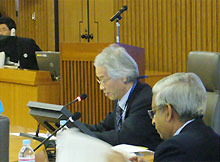 Dr. Machi gave a summary of the Seventh FNCA Ministerial-Level Meeting (MM) held in Kuantan , Malaysia , on November 27, 2006 . Among other agreements, the Seventh FNCA MM took note of a proposal of the Panel on "Role of Nuclear Energy for Sustainable Development in Asia" agreed to appeal, as a group, to the Conference of Parties (COP) to the United Nations Framework Convention on Climate Change (UNFCCC) for nuclear power to be included as a Clean Development Mechanism (CDM) under the Kyoto Protocol. The secretariat was requested to prepare and circulate the draft declaration of appeal to all member countries at an early date for consultation with relevant ministries. The draft will be discussed at the Eighth MM . Dr. Machi gave a summary of the Seventh FNCA Ministerial-Level Meeting (MM) held in Kuantan , Malaysia , on November 27, 2006 . Among other agreements, the Seventh FNCA MM took note of a proposal of the Panel on "Role of Nuclear Energy for Sustainable Development in Asia" agreed to appeal, as a group, to the Conference of Parties (COP) to the United Nations Framework Convention on Climate Change (UNFCCC) for nuclear power to be included as a Clean Development Mechanism (CDM) under the Kyoto Protocol. The secretariat was requested to prepare and circulate the draft declaration of appeal to all member countries at an early date for consultation with relevant ministries. The draft will be discussed at the Eighth MM .
2: Development in Asia and Nuclear Energy
The Meeting took note of the report by Dr. Machi on the outputs of the Panel on Role of Nuclear Energy for Sustainable Development in Asia . He also reported on a future cooperation plan under a new Study Panel for Cooperation in the Field of Nuclear Energy in Asia formed at the Seventh FNCA MM. The order of the priority areas to be tackled by the Study Panel was discussed. There was a general support for human resources development and public acceptance of nuclear power as the priority areas for the Panel Meeting. The importance of other related areas, such as economic and financial aspects including CDM, waste management, nuclear safety, security and nonproliferation issues should be also considered. 3: Progress, Evaluation and Planning of FNCA Projects
The activities of on-going projects and their future plans were reported by the FNCA Project Leaders. The meeting took note of the progress of on-going projects. (1) Public Information of Nuclear Energy (PI)
Mr. Minoru Kubo, Project Leader of Japan, reported the results of the 2006 PI Project Leaders Meeting held in Jakarta, Indonesia, and presented the specific outputs of six activities, namely: (a) Asia Nuclear Cooperation Network, (b) Communications with the mass media, (c) Regional Speakers Bureau, (d) Training of Nuclear Communicators, (e) Annual Project Leaders Meeting, and (f) Open Seminar for the Public. The meeting suggested that open seminars for the public and professionals should be strengthened. Quick action and transparency in giving information to the mass media especially in the event of an incident and accident are essential in gaining the trust of the public. It was agreed also that exhibition materials related to nuclear power should be shared among FNCA countries. The training of personnel involved in public information should be included in ANTEP. Applications for Agriculture
(2) Mutation Breeding (MB)
Dr. Hitoshi Nakagawa, Project Leader of Japan, reported the results of the 2006 MB Workshop held in Takasaki , Japan , and the outputs of the three sub-projects, namely: (a) Drought Tolerance in Sorghum and Soybean, (b) Insect Resistance in Orchid and (c) Disease Resistance in Banana. The sub-project on drought tolerance in sorghum and soybean is terminating this year with the following achievements: development of drought tolerant sorghum and soybean mutant varieties, and successful exchange of genetic materials among participating member countries.
The new sub-project on "Composition or Quality Improvement in Rice" was proposed for FY2007-2011. The purpose of the project is to develop new varieties of rice of low amylose content using mutation breeding techniques. The Meeting agreed to support the proposal and suggested that close collaboration with the Department of Agriculture in FNCA member countries be established. (3) Biofertilizer (BF)
Dr. Tadashi Yokoyama, Project Leader of Japan, reported the results of the 2006 BF Workshop held in Chiangmai , Thailand , and the accomplishments of the project with six working topics, namely: (a) Selection of Effective Microorganisms, (b) Improvement of Inoculants, (c)Improvement of Soil Microbial Activities, (d) Field Trials, (e) Economic Analysis and (f) Radiation Sterilization of Carrier. Other activities included publication of the Biofertilizer Manual and Biofertilizer Newsletter. The meeting took note of the achievements of the project.
The Meeting approved in principle the new project entitled, "Development of New Multi-functional Biofertilizers for Sustainable Agriculture" for FY 2007-2011. However, the meeting recommended that careful assessment should be done to ensure that the project meets the specific needs of each participating country and that collaboration with the agricultural sector should be strengthened. Medical Care
(4) Cyclotron and PET in Medicine (PET)
Mr. Adnan Bin Haji Khalid, FNCA Coordinator of Malaysia and Dr. Keigo Endo, Project Leader of Japan, presented the status of the project. The Meeting noted the progress made in the first workshop held in Kuala Lumpur , Malaysia . It was suggested that the cost to benefit ratio of using PET-CT be studied, and an alternative system of producing FDG through a central cyclotron facility be examined, in terms of economic benefits, in the future. Malaysia informed the Meeting that more experts will be supported for the second workshop in Malaysia to ensure better participation in the three components of the project. Given the similar activity in RCA, the project should ensure synergy with RCA. The meeting agreed on the importance of personnel training. Dr. Prinath Dias, IAEA Senior Program Management Officer and RCA Focal Person, informed that the RCA distance learning material for nuclear medical technologists would be extended to include a module on PET-CT. (5) Radiation Oncology (RO)
Dr. Hirohiko Tsujii, Project Leader of Japan made a presentation on the results of the 2006 RO Workshop held in Hanoi and Ho Chi Minh, Vietnam, and the progress of the project carried out in establishing the new protocols for treatment of advanced cervical cancer and nasophyryngeal cancer.
The main activities of the project are (a) Phase II study of CRT for advanced cervical cancer (CERVIX-III), (b) Early phase II studies of CRT for NPC, (c) QA/QC project for brachytherapy.
The meeting took note that the results obtained in the study so far for cervical cancer gave survival rates comparable or better than other studies. In addition, the outcome of the project's activities was presented in the IAEA/RCA regional training course on radiation therapy.
The meeting proposed that in the future, diagnostic tools using PET-CT could also be applied in radiation oncology project. Industrial Application
(6) Utilization of Electron Accelerator (EB)
Dr. Tamikazu Kume, Project Leader of Japan, reported the results of the 2006 EB Workshop held in Kuala Lumpur , Malaysia . He presented the status of the project involving radiation processing of natural polymers and requested an extension until FY2008. There was general support for the extension of the project to complete the commercialization of selected products by the participating countries. The meeting agreed that the FNCA and RCA should work closely in this area. (7) Nuclear Safety Culture (NSC)
Dr. Ron Cameron, FNCA Coordinator of Australia, reviewed the current status and presented the action plan of the project for the coming years. Dr. Tsutomu Yokoyama, Project Leader of Japan reported the results of the peer review conducted at the PUSPATI research reactor in Malaysia and the workshop also held in Kuala Lumpur, Malaysia.
The Meeting took note that the results of the self assessment and four peer reviews affirmed the commitment of FNCA countries to enhance nuclear safety in the operation of their respective nuclear research reactors.
The Meeting agreed to support the activities planned for the future years consisting of peer reviews and workshops, and supported the proposal to change the title of the project to nuclear safety management. (8) Radioactive Waste Management (RWM)
Prof. Toshiso Kosako, Project Leader of Japan, presented a review of the activities and accomplishments of the project. These include the successful conduct of the RWM Workshop held in Beijing , China ; presentation of papers on conceptual design of near surface depository, waste treatment and conditioning for disposal, and management of medical waste at the sub-meetings, launching of the decommissioning/ clearance task group activity, and the conduct of site visits in Australia and Malaysia .
The Meeting agreed that safe and reliable radioactive waste management is an important activity closely linked with nuclear applications in all FNCA countries as it is of public concern.
The Meeting also recognized that some countries will decommission and dismantle their research reactors in the future. In addition, there is a need to manage hospital waste. Therefore the activities on RWM project should also consider how to meet these needs.
(9) Human Resources Development (HRD)
Mr. Hideo Matsuzuru, Project Leader of Japan, presented a review of the activities of the HRD project and reported the results of the 2006 HRD Workshop held in Shenzhen , China . The Workshop came up with the analysis of HRD needs and programs resulting in 49 good matching cases. This may be a very useful reference for FNCA member countries in placing their fellows (trainees) either by multilateral or bilateral arrangements.
Dr. Machi has proposed to pilot the ANTEP. Malaysia responded positively by informing the meeting to implement it through bilateral arrangement using her own funds. Dr. Machi requested member countries to support the ANTEP activities through in-kind contribution.
The meeting recognized that training on nuclear power is a common need of the non-nuclear power member countries. The nuclear power member countries were requested to consider taking in FNCA trainees in this area.
The meeting noted that Japan 's MEXT program has been an important mechanism in responding to the training needs of FNCA member countries. Other mechanisms may also be available to meet the requirements of FNCA countries. Utilization of Research Reactors
Overview of the Research Reactor Projects
Dr. Hideaki Yokomizo, Chairman, Steering Group of Utilization of Research Reactors, presented an overview of the sub-projects; Tc-99m Generator, Neutron Activation Analysis and Research Reactor Technology. The accomplishments and work plans of the projects were presented during the workshop held in Manila , Philippines . (10) Tc-99m Generator Project (TCG) ;
Dr. Tsuguo Genka, Project Leader of Japan, reported the achievements of the project. The objective of the project is to promote the practical application of PZC-type Tc-99m generator. The PZC technology is now ready to be transferred to the member countries for routine production of Tc-99m generator. It was noted that development of the PZC technology is one of the most tangible outputs of the FNCA projects. The Meeting took note that several countries such as Vietnam , Malaysia , the Philippines , Indonesia and Japan are taking steps to commercialize the technology. (11) Neutron Activation Analysis (NAA)
Dr. Mitsuru Ebihara, Project Leader of Japan, made a presentation on the progress and achievements of the project. He briefly introduced the activities of each country, primarily on environmental pollution monitoring using NAA. The Meeting suggested that collaboration between this project and the RCA project on "Monitoring Air Pollution Using Nuclear Techniques" be strengthened. The Meeting agreed to continue into Phase III and suggested that the project in the future should consider other areas such as food safety analysis using NAA and other complementary analytical techniques like ICP-MS. (12) Research Reactor Technology Project (RRT)
Dr. Kiyonobu Yamashita, Project Leader of Japan, presented the progress and achievements of the project which aims to improve and harmonize neutronics calculation techniques for reactor core management among participating countries. The Meeting noted the progress being made in the application of SRAC for core burn up calculations, and the use of SRAC and MVP for advanced utilizations of research reactors by the participating countries. The Meeting agreed that the next theme for the project should be on reactor safety analysis.
Invited Speech
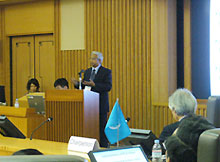 Dr. Prinath Dias, IAEA Senior Program Management Officer and RCA Focal Person, made a presentation on "Regional Cooperation Agreement (RCA) for Asia and Pacific Region" including achievements, future direction and RCA-FNCA collaboration. Dr. Prinath Dias, IAEA Senior Program Management Officer and RCA Focal Person, made a presentation on "Regional Cooperation Agreement (RCA) for Asia and Pacific Region" including achievements, future direction and RCA-FNCA collaboration.
The discussion was focused on possible future collaboration between FNCA and RCA. Dr. Machi stated that the FNCA proposed participation by non-FNCA member countries in the projects, radiation oncology and radiation processing technology at the last National Representatives Meeting held in Bangkok in 2006 and that this proposal was accepted by the RCA-GC in 2006. Dr. Dias proposed that the collaboration need not be limited to the above projects only, but could include past activities, such as PZC based Tc-99m generator.
Dr. Daud of Malaysia commented that the collaboration should first start with one or two projects. The collaboration can be expanded step by step while both sides gain experience in implementing joint/complementary activities
Dr. Cameron of Australia proposed that both RCA and FNCA should prepare a matrix to enable experts to determine areas of duplication, overlapping, complementarity and possible collaboration.
Dr. Yang of China commented that FNCA Coordinators of several FNCA countries are National Representatives of RCA, therefore synergy of FNCA and RCA should be possible by coordination.
Dr. Machi stated that FNCA technical projects are designed for R&D and human resources development while RCA places priority on technology transfer through a number of expert missions and regional training courses. Therefore FNCA and RCA are complementary and have synergy.
4 : Administrative Issues
- On the Tc-99m Project:
The Meeting agreed to conduct expert missions for three Member Countries, i.e. Malaysia , Vietnam and the Philippines . Indonesia indicated that she would assure the supply of Mo-99 for the FNCA countries. However, the Meeting noted there is a need to consider alternative back-up supply of Mo-99 from countries such as Korea , China and Japan apart from Indonesia to ensure sustainable supply of Mo-99.
- On the Biofertilizer Project:
The project should be continued to the next phase with strong collaboration and linkages with end-users such as the Department of Agriculture. The meeting suggested that the selection of the appropriate Project Leaders is important to ensure meeting the objectives of the project.
- On the Improvement of Project Implementation:
The Meeting agreed that Annual Workshops should suffice. However, the researchers are encouraged to network at all time using information technology. In addition, open seminars are useful to inform the public and stakeholders of the results of the projects that are not only for knowledge generation but also wealth creation and societal well-being.
- FNCA/RCA Collaboration:
It was agreed in principle that both FNCA and RCA should collaborate and two areas of Radiation Processing Technology and Radiation Oncology were suggested. However, it was proposed that the respective Project Leaders of Japan and Project Lead Country Coordinators meet to discuss the details of the collaboration. It was suggested that the collaboration between FNCA and RCA should be discussed at the next NRM of RCA in Sydney and the outcome should be informed to the FNCA countries by Dr. Machi for comments or endorsement.
Wrap-up Session
In the Wrap-up Session, the drafted minutes of the Eighth CM were discussed and confirmed by the delegates. Closing Session
In the Closing Session, the Minutes of the Eighth CM were adopted by the delegates.
Dr. Machi gave the closing remarks, expressing his appreciation to all delegates for their excellent contribution. He stated that FNCA has achieved specific tangible results in each project which should benefit more member countries by further effort of FNCA Coordinators.
On behalf of the delegates, Dr. Daud thanked the Japanese government and Japan Atomic Industrial Forum for successfully hosting the meeting and expressed their appreciation for the excellent support for FNCA.
|
